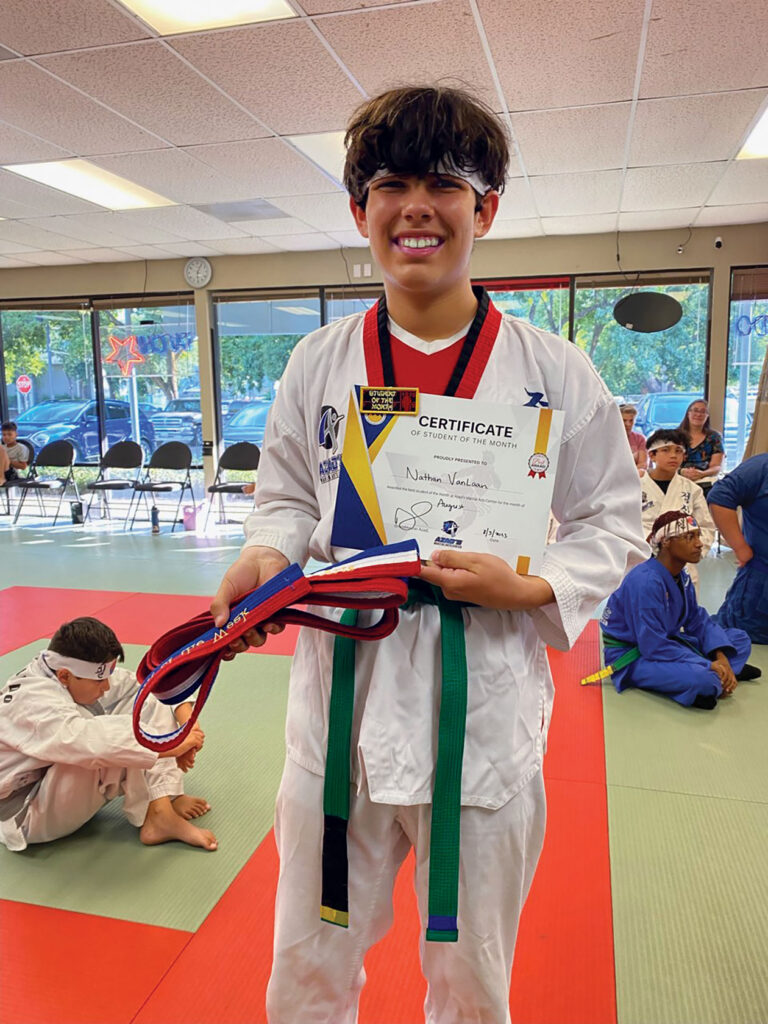Martial arts training can promote all-around wellness in children. On a physical level, these disciplines build strength, balance, flexibility and stamina—because they utilize the full body. But martial arts training is a mental workout, too. Students must learn to control their own minds and anticipate the reactions of others. Many parents notice increased focus, respect and confidence in kids who participate regularly.

15 year-old Nathan Van Laan, recent recipient of the Student of the Month award at Azad’s Martial Arts Studio.
Before choosing a martial arts class, it might help to consider which aspects of training appeal to your child. Some disciplines focus on real-life defense moves. Others train for competition, or even performance. Is there a cultural or historical aspect that might be of interest? The best way to find the perfect fit is to take a few introductory classes and compare. Here’s a quick look at the most common martial arts styles for kids.
Taekwondo
Taekwondo is the most widely practiced martial art in the world. Perhaps you’ve watched it in the Summer Olympics. This Korean sport is known for its focus on kicking techniques. Students will master head-height kicks, spinning kicks and fast-kicking. In addition to individual strikes and blocks, practitioners learn longer combinations known as forms. Character development is an important aspect of training as students strive to live by the Five Tenets of Taekwondo: courtesy, integrity, perseverance, self-control and indomitable spirit.
Kung Fu
Kung Fu refers to a variety of Chinese martial arts styles, including Wing Chun and Choy Li Fut. With unparalleled legend and history, these disciplines trace their origins to the earliest Chinese dynasties and the famed Shaolin Temple monks. Students will learn to remain calm and focused while reacting to an opponent. The sifu (instructor) may incorporate ancient philosophy, as well as training to harness the qi (energy, or life force). In addition to strikes and blocks, students might learn throws, joint-locks and pressure points. Some styles incorporate weapons. If you’ve seen the Marvel movies “Shang-Chi and the Legend of the Ten Rings” or “Doctor Strange,” you’ve seen Kung Fu in action.
Karate
Karate is an Okinawan Japanese art that teaches balanced, full-body striking with the hands and feet. Compared to other disciplines, there is a greater focus on hand strikes, including those with an open hand (karate chop). Board and brick-breaking are common in this style. The sensei (instructor) will work with students to cultivate self-mastery and self-discipline. Students strive to develop a proper kokoro (attitude), which includes being humble, gentle and not easily drawn into a fight. Karate can be seen in the movies “The Karate Kid” and “Cobra Kai.”
Brazilian Jiu Jitsu (BJJ)
In Brazilian Jiu Jitsu, a smaller person can learn to effectively defend against a bigger, heavier person by leveraging weight distribution and taking the fight to the ground. Students focus on sweeps, takedowns and grappling on the floor. Ultimately, the opponent will be forced into submission through joint locks or chokeholds. Striking is strictly forbidden in BJJ, so students won’t encounter punches or kicks in this discipline.
Muay Thai
Muay Thai originated in Thailand and is sometimes called “Thai boxing.” Traditionally, there is no ranking system (like belt colors). This is a close-fighting style with a focus on striking and clinching. While some combat disciplines teach four points of contact for striking opponents—two hands and two feet—Muay Thai utilizes eight points, to include knees and elbows. Young students can expect to wear plenty of protective gear.
Aikido
Considered a gentler martial art, Japanese Aikido was designed to neutralize attackers without injuring them. This is largely accomplished using wristlocks and takedowns. Students learn to flow with the attacker’s momentum, rather than opposing it. For this reason, physical strength is far less important than skill. The philosophy of Aikido is to overcome oneself instead of cultivating violence or aggression. Training may include use of swords and staffs. If you’ve ever watched a Steven Seagal movie, you’re familiar with Aikido.
Capoeira
Capoeira is a unique combination of martial arts, dance, acrobatics and music training. It is a wonderful physical and artistic outlet, especially for those interested in Brazilian culture. It is typical for students to play Brazilian instruments and sing in Portuguese while performing a capoeira routine.
Here in the North State, Azad’s Martial Arts Center in Chico offers classes for kids, teens and adults of all ages in a wide variety of martial arts systems including Muay Thai, Kickboxing, Brazilian Jiu-Jitsu, Judo, Hapkido, Taekwondo, Karate, Tai Chi, Jongshindo, Southeast Asian fighting systems and also Shimkendo for Seniors. With nearly 50 years of experience teaching martial arts, owner and instructor Grand Master Farshad Azad (10th Degree Black Belt) understands how to lead kids to improve physically, mentally, emotionally and academically. His Rock Solid Teens program helps empower kids to overcome personal challenges and to make healthy life choices. Grand Master Azad also encourages students to practice respect, kindness and compassion by helping others throughout the community.
“We work hand in hand with parents, grandparents, schools and teachers to bring out the best in each student and strengthen each child to become the best version of themselves, beyond the realm of martial arts, techniques and movements,” says Grand Master Azad.
At Azad’s martial arts, students learn a variety of powerful, practical self-defense techniques and strategies to be safe in any situation.
To learn more about classes, training and programs offered at Azad’s Martial Arts Center, go to azadsmartialarts.com or call (530)-892-AZAD (2923).
Posted in: Youth & Teen
Comment Policy: All viewpoints are welcome, but comments should remain relevant. Personal attacks, profanity, and aggressive behavior are not allowed. No spam, advertising, or promoting of products/services. Please, only use your real name and limit the amount of links submitted in your comment.
You Might Also Like...

Helping Introverted & Highly Sensitive Kids Thrive
These days my teenage daughter cheerfully refers to herself as an ambivert, meaning a person who has both introvert and extrovert qualities. But this was not always the case. When […]

How To Throw an Eco-Friendly Birthday Party Your Kids Will Love
Children are learning at an early age how important it is to protect our environment. Whether they hear about climate change, plastic pollution, animal extinction or other critical environmental issues […]

A Cuddly, Candy-Free Halloween Gift That Children Will Love
Before we know it, Halloween will be here to enchant children big and small. If you are looking for a candy-free Halloween gift for your children, consider giving an adorable, […]




